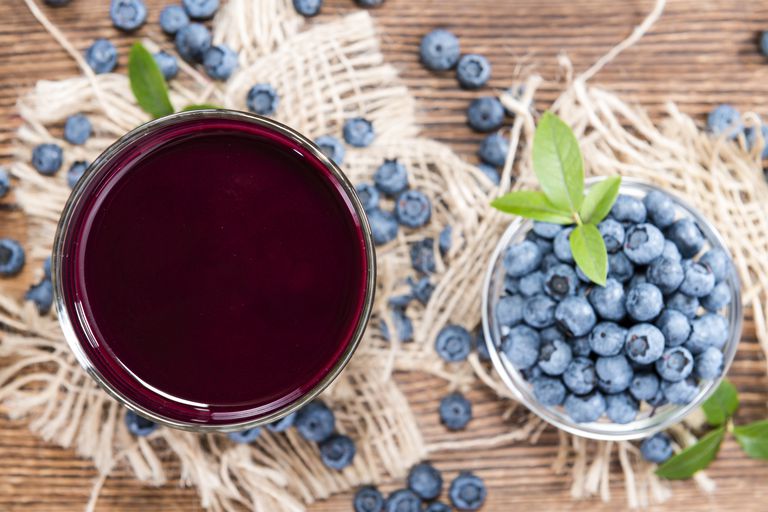
Blueberry Extract Uses and Benefits
- Post by: redazione
- 6:38 mar 22, 2018
- Comments off
Blueberry extract is a natural substance sold in powder, juice, or supplement form. It can be sourced from cultivated (“highbush”) blueberries or the smaller wild (“lowbush”) blueberries. Said to offer a range of health benefits, blueberry extract is often touted as a rich source of antioxidants. These antioxidants include anthocyanins, a class of compounds purported to reduce inflammation and protect against heart disease and cancer.
Other fruits and vegetables rich in anthocyanins include blackberries, cherries, raspberries, grapes, red onion, and red radishes.
Uses for Blueberry Extract
Blueberry extract is often used to treat or prevent the following conditions:
In addition, blueberry extract is said to boost the health of blood vessels.
Benefits of Blueberry Extract
Although research on the health effects of blueberry extract is fairly limited, some studies suggest that blueberries may offer certain benefits. Here’s a look at some key findings from the available research:
Cognitive Function
Research on blueberries and cognitive function has used fresh blueberries, blueberry powder, or blueberry juice concentrate. In a study published in Food & Function in 2017, researchers examined the cognitive effects of consuming either freeze-dried blueberry powder or a placebo on a group of children between the ages of seven and 10.
Consuming freeze-dried blueberry may improve some aspects of cognitive function in adults. In a study published in the European Journal of Nutrition, for instance, people between the ages of 60 and 75 consumed either freeze-dried blueberry or a placebo for 90 days.
Participants completed tests on balance, gait, and cognition at the beginning and again at days 45 and 90. While there was no improvement in gait or balance, those who took blueberry performed better on cognitive tests (including task-switching and verbal learning).
Mood
Consuming a blueberry drink may improve subjective well-being, according to a study published in 2017. For the study, children and young adults drank a blueberry drink or a placebo. Participants’ mood was assessed before and two hours after drinking the beverages. Researchers found that the blueberry drink increased positive affect (but had no effect on negative affect).
Diabetes
Preliminary studies suggest that blueberries may improve insulin resistance and glucose tolerance. In a report published in Critical Reviews in Food Science and Nutrition in 2018, researchers reviewed previously published clinical trials on blueberry or cranberry consumption on type 2 diabetes glycemic control. In their review, they found that blueberry extract or powder supplementation (providing 9.1 to 9.8 mg of anthocyanins, respectively) for 8 to 12 weeks had a beneficial effect on glucose control in people with type 2 diabetes.
High Blood Pressure
Blueberry supplementation may not help keep blood pressure in check, according to report published in 2017. Researchers analyzed previously published trials and found no significant effect of blueberry supplementation on blood pressure. In their conclusion, the study’s authors recommended further clinical trials to verify the link between blueberry supplements and blood pressure.
Another study found that six weeks of daily blueberry consumption didn’t improve blood pressure, however it did improve endothelial function. (The inner lining of the small arteries, the endothelium is involved in many vital functions in the body.)
Side Effects
To date, little is known about the safety of long-term use of blueberry extract supplements. However, since blueberry extract may lower blood sugar levels, it’s important to take caution when using these supplements in combination with diabetes medication. Learn more about the safe use of dietary supplements.
Where to Find It
Widely available for purchase online, supplements containing blueberry extract can be found in many natural-foods stores and drugstores.
Alternatives
A number of other natural remedies also contain anthocyanins. These include bilberry, acai, chokeberry, tart cherries, and elderberry.
In addition, you can increase your intake of anthocyanins by consuming whole blueberries (as well as other types of berries, red onions, kidney beans, pomegranates, and grapes).
Sources:
Khalid S, Barfoot KL, May G, et al. Effects of Acute Blueberry Flavonoids on Mood in Children and Young Adults. Nutrients. 2017 Feb 20;9(2). pii: E158.
Miller MG, Hamilton DA, Joseph JA, Shukitt-Hale B. Dietary blueberry improves cognition among older adults in a randomized, double-blind, placebo-controlled trial. Eur J Nutr. 2017 Mar 10.
Rocha DMUP, Caldas APS, da Silva BP, Hermsdorff HHM, Alfenas RCG. Effects of blueberry and cranberry consumption on type 2 diabetes glycemic control: A systematic review. Crit Rev Food Sci Nutr. 2018 Jan 18:1-13.
Whyte AR, Schafer G, Williams CM. The effect of cognitive demand on performance of an executive function task following wild blueberry supplementation in 7 to 10 years old children. Food Funct. 2017 Nov 15;8(11):4129-4138.
Zhu Y, Sun J, Lu W, et al. Effects of blueberry supplementation on blood pressure: a systematic review and meta-analysis of randomized clinical trials. J Hum Hypertens. 2017 Mar;31(3):165-171.
https://www.verywell.com/blueberry-extract-89424